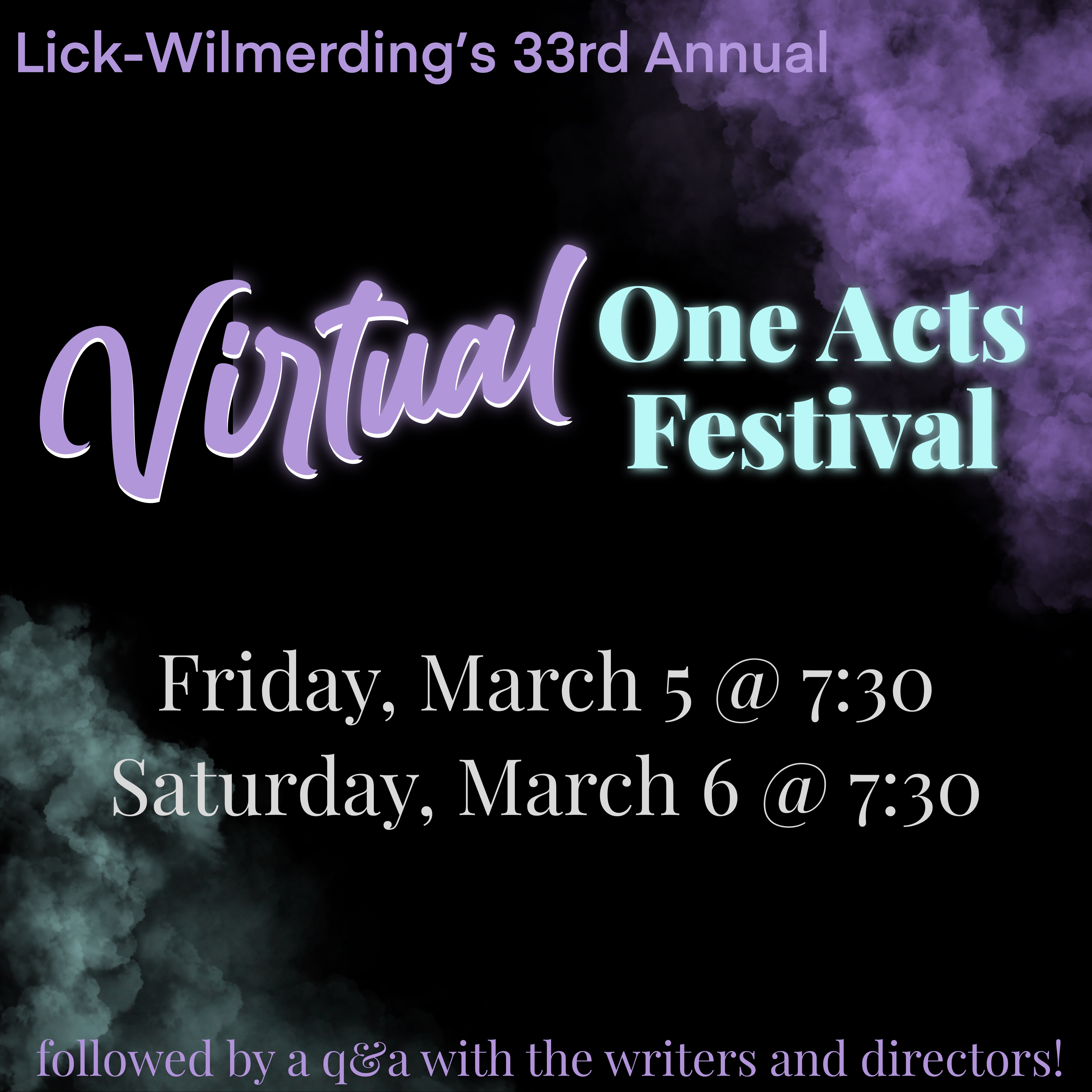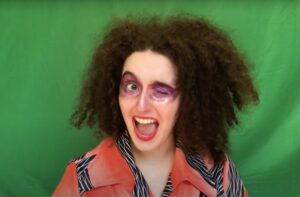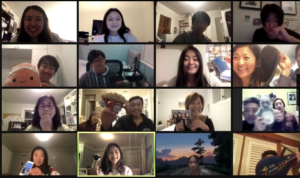View the LWHS One Acts 2021: Here
The directors of LWHS’ 33rd Annual One Acts were bold in choosing to livestream the production as a Zoom webinar — unlike anything done before in LWHS history.
Seniors Gabrielle Milman, Michael DeLaurier and Buddy Pendergast took Theatre Teacher Miguel Zavala’s directing class in person last year with the expectation of being able to direct a typical LWHS One Acts Festival: long rehearsals in classrooms with their actors culminating in a full-fledged stage performance in the theater with a set, lights, bustling audience and interludes. However, nothing about this year has been typical.
As the lights went down on March 5, actors did not experience what many performers know well: the minutes leading up to opening night. There was no peering through the curtains to hear the murmur of a crowd slowly filing into the auditorium or adjusting finicky microphones and touching up lipsticks. The energy of the One Acts this year was vastly different as actors warmed up alone in their bedrooms and viewers logged onto Zoom at 7:30 that evening, unsure of what to expect.
The night began with a Pendergast-directed One Act: “Looking for Love: Quarantine Edition.” Written by Charlotte Wyman ’23, this One Act was set on Zoom so Pendergast was able to sidestep many of the potential issues of remote acting. “It was a dating One Act about speed dating on Zoom. It was kind of focused on two main characters interacting with crazy characters who have each experienced something strange because of COVID. We see their desperation for social interaction play out. In that way, it’s very much comedy, but then it concludes with the two main characters coming together and finding a connection which is what they’re looking for,” said Pendergast.
Pendergast says he was motivated to try to direct a One Act that was as close as possible to a live performance: “Our big motivation to do this was to preserve theater. For us, theater is live performance where something could go wrong. During our first performance, one of my actor’s internet went down completely and they had to ad-lib a whole scene — making it up on the spot.” Pendergast explained that preserving that kind of theater was an area of focus for the directors. Moments like that would be lost if they had chosen to pre-record the performances.
DeLaurier directed another One Act set on Zoom. Senior Nathan Gilbert‘s “What Did I Do to Deserve This?” is described by DeLaurier as “a job interview that takes place over Zoom and very quickly goes awry when the person interviewing forgot that he had scheduled the time slot. He invited several other people to interview at the same time. The interview quickly crashes and burns.” This was the second play of the evening and carried forward the tone of the night, “I would say it’s a comedic play, but it has some pretty interesting commentary about the corporate world — it’s a comedy, with some fun twists in it,” DeLaurier said.
Gilbert reflected that when trying to write with Zoom in mind he “needed to figure out a way to make the show entertaining without requiring the actor needing to move.” Gilbert paid high attention to detail in his creative process: “In the original drafts of the script, I had a number of running gags that I had to cut because they just didn’t work over Zoom. I had to refrain from writing dialogue that was too fast and quippy because the short delay between actors would mess up the comedic flow,” Gilbert said.
Milman directed “Like, in Totally Cold Blood, Dude,” which was written by Ruthie Zapol ’22. The play is a series of daily Zoom calls “between the National Scientific Foundation in Washington, D.C. and South Pole Station in the frozen wasteland of Antarctica. Although in his office in the Washington, D.C. headquarters, Colin Watts, a remote manager of the South Pole research team, develops feelings for one of the scientists there, a surfer dude named Kale Wilson.” This One Act was a comic murder mystery, with romantic undertones: “[Colin’s] love for Kale blossoms against the backdrop of the only-ever murder to have been committed in Antarctica. Colin, as well as the resident doctor at South Pole Station and an obnoxious French detective, called from France to solve the mystery, become caught up in the global surfer-cult scheme to kill off all non-surfers in Antarctica. Because of global warming, Antarctica is envisioned as a surfer haven of the future.” This One Act was based on the true story of Antarctica’s only murder, which is still unsolved.
Writing and directing the One Acts offers a great growth opportunity. The dynamic collaboration “was really special because, as the actors were trying out the lines in rehearsals, playwrights could see how it was going and make edits as they wanted to. It was a really fluid creative process,” said DeLaurier.
The writers and directors of the One Act Festival worked closely with playwright, director, and teacher Aren Haun.
Zapol worked with both her director (Milman) and Haun to guide the direction of her play. “[The play] evolved a lot from when I first submitted it to when it was performed. I think probably what shaped my play the most was watching the actors in rehearsal, they gave the characters life and inspired so much of the script,” said Zapol.
The directors and actors met the challenge presented by the limitations of Zoom. “Once we were in the rehearsal process for a while, we discovered new things that we could do on Zoom that we couldn’t do live. We really tried to play with that as much as possible,” DeLaurier said. “On Zoom, you can physically control everything that the audience sees exactly which is not something you can do in live, in-person theater.”
Pendergast emphasized the importance of avoiding a situation where actors would just recite lines straight into their screen. To enliven the Zoom performances the directors would prompt actors to experiment with different computer angles and in assuming different positions in relation to the camera. “We did a lot of trying to force people to not get stuck in the monologue — to use their surroundings,” said Pendergast.
DeLaurier recalled that this experimentation was made easy by the cast and crew’s open minds, willingness and enthusiasm. “I made great friends and had a great time; I am proud of everyone for sticking to it,” DeLaurier said. Each director felt that a feeling of community was created despite the online platform. Students from every grade were able to bond, even without ever seeing each other in person.
Alas, there was no way to replace the excitement and energy of performing before a live audience. “One of my favorite things about live theater, and theater in general, is just having that reaction from an audience, that instant gratification — shock, sadness, laughter — that sweeps over the theater. That is something we couldn’t preserve on a virtual platform,” said Pendergast when reflecting on some of the challenges of virtual performance. “When my actors were acting, the only thing they could see was their fellow actors and the Zoom boxes.”
While this was a drawback for many directors and actors, Pendergast provided an alternate viewpoint: “I know one of my freshmen actors really appreciated that you don’t have to worry about having a sold-out theater of 300 people watching you. The audience is only the other actor who you’ve been rehearsing with for two months.” A total of about 140-180 people attended, but many more will be able to experience this event as many times as they like. The One Acts are now uploaded to the school website.
Zapol echoed sentiments from actors, directors and crew alike: “the show was incredible, all the actors were amazing. I was worried the energy and excitement of an in-person show would be missing over Zoom but it wasn’t. I am so incredibly proud of all of the actors and could not be happier with how the performance went.”
Looking Ahead: “Time Capsule,” a Storytelling Podcast
The Lick Theater Department has one more significant offering for their 2020-21 season. This spring, they plan to turn from the whimsical, fantastical escapism of A Midsummer Night’s Dream and the humor of the One Acts to a more serious and reflective tone. Zavala is working to create “Time Capsule,” a storytelling podcast filled with narrative stories, music, poetry, spoken word and anything else students can imagine or create to express the complexities and nuances of living through this past year.
Zavala describes, “Students will submit work answering the question: what has it felt like to be you in 2020/2021? What experiences do you want to/need to talk about, and how do you want to use creative work to heal?”
He continues, “In addition, we’re putting together a workshop series. Once a week or every two weeks, a guest artist will visit over Zoom and lead a creative workshop with students who have signed up to participate. In order for this to work, though, and make it worth the time of the guest artists, we need to have students commit in advance to attending all of the workshops. This is a chance to connect with and learn from inspiring creative artists!”







